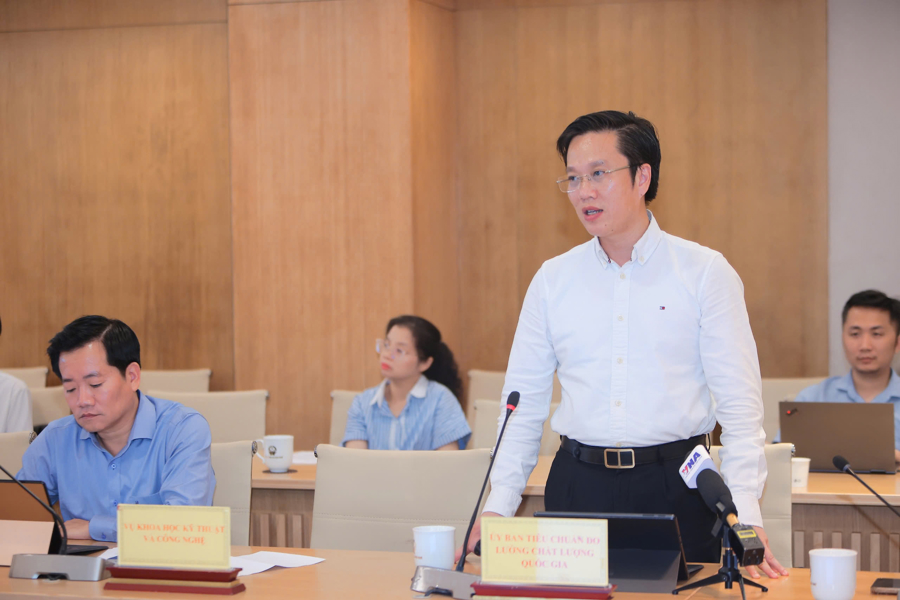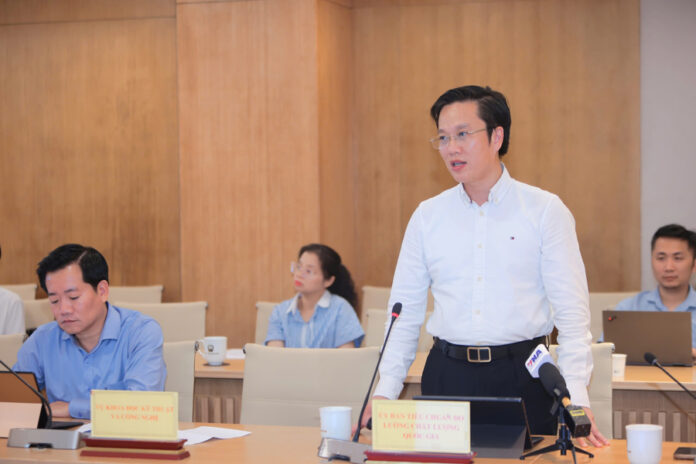According to Mr. Ha Minh Hiep, Chairman of the National Committee for Standards, Metrology, and Quality (under the Ministry of Science and Technology), these new regulations in the Law Amending and Supplementing Articles of the Law on Product and Goods Quality (taking effect on January 1, 2026) will enhance corporate accountability and consumer protection.
This amendment introduces a comprehensive overhaul of the product quality management approach, guided by five key orientations.
Firstly, it shifts to a risk-based management model. Specifically, the classification of products has been changed from administrative groups to three risk levels: low, medium, and high. It prioritizes monitoring and post-inspection over pre-inspection to increase efficiency and reduce administrative intervention.
For low-risk products, businesses are allowed to self-declare applicable standards. Medium-risk products require self-assessment or certification from an accredited organization, in addition to standard declaration. High-risk products mandate third-party certification for businesses.

Secondly, it simplifies import procedures. The Law now facilitates the import of medium-risk goods by allowing them to be declared compliant based on self-assessment or certification from an accredited organization. This declaration is valid for subsequent batches of the same type of goods unless there are changes in technical regulations, product characteristics, or warnings from competent authorities.
Thirdly, for the first time, the Law establishes a legal framework for the National Quality Infrastructure (NQI). The NQI is an ecosystem encompassing standards, metrology, conformity assessment (including accreditation), inspection, and policy development.
The state will invest in building the NQI on a digital and AI-powered platform, ensuring data connectivity and sharing among quality inspection agencies, customs, traceability systems, consumer feedback channels, and international warning networks to enhance monitoring and early warning capabilities.
“For the first time, traceability has been legalized, marking a significant step forward in product quality management. Notably, for high-risk products, traceability will become a mandatory requirement,” said Mr. Hiep.
Fourthly, the Law mandates the establishment of a national product quality monitoring system. This system connects data across management agencies, collects and analyzes consumer feedback and warnings, and supports post-inspection and risk management.
Finally, it introduces regulations for managing the quality of goods traded on digital platforms. These regulations clarify the responsibilities of sellers and platform intermediaries regarding product quality. Sellers must provide truthful information about product quality. Platform intermediaries must implement measures to check and handle goods that violate quality regulations and establish systems to receive and process consumer feedback and complaints related to product quality.
Mr. Hiep emphasized that these new regulations aim to enhance corporate accountability in disclosing product information, especially for electronic goods. Previously, e-commerce platforms allowed households to freely sell products without verification. However, going forward, these platforms will be required to provide certification for all products.
The Law Amending and Supplementing Articles of the Law on Product and Goods Quality reflects a clear shift in legislative thinking: from rigid administrative management to risk governance, from encouragement to reasonable sanctions, and from pre-inspection to post-inspection based on data and digital technology. This not only improves law enforcement effectiveness but also reduces compliance costs for businesses, enhances national competitiveness, and ensures fairness and transparency in the market.
The Crafty Concoction: Unveiling the Secrets Behind the ‘Luxury’ Skincare Empire
Since 2019, H. has been operating without a cosmetics manufacturing license. Despite this, they have been ordering printed packaging and purchasing untraceable foundation creams, which they then fill and package under their private label.
Streamlining VietinBank’s Network for Smarter Transactions
Deep digitization of products and services, redesigning business processes, trimming the traditional transaction network, and harnessing the power of data – these are the key focus areas that VietinBank has, is, and will be undertaking to accelerate comprehensive digital transformation.







![[Photo Essay]: Experts, Managers, and Businesses Unite to Forge a Path Towards Sustainable Green Industry](https://xe.today/wp-content/uploads/2025/07/z678592918-218x150.jpg)




![[Photo Essay]: Experts, Managers, and Businesses Unite to Forge a Path Towards Sustainable Green Industry](https://xe.today/wp-content/uploads/2025/07/z678592918-150x150.jpg)


![[Photo Essay]: Experts, Managers, and Businesses Unite to Forge a Path Towards Sustainable Green Industry](https://xe.today/wp-content/uploads/2025/07/z678592918-100x70.jpg)





